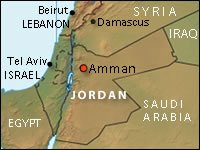Deadly Explosions Rock Three Jordan Hotels
 Suicide bombers carried out nearly simultaneous attacks on three U.S.-based hotels in the Jordanian capital Wednesday night, killing at least 57 people and wounding more than 100 in what appeared to be an al Qaeda assault on an Arab kingdom with close ties to the United States and a common border with Iraq.
Suicide bombers carried out nearly simultaneous attacks on three U.S.-based hotels in the Jordanian capital Wednesday night, killing at least 57 people and wounding more than 100 in what appeared to be an al Qaeda assault on an Arab kingdom with close ties to the United States and a common border with Iraq.
The explosions hit the Grand Hyatt, Radisson SAS and Days Inn hotels just before 9 p.m. One of the blasts took place inside a wedding hall where 300 guests were celebrating. Black smoke rose into the night, and wounded victims stumbled from the hotels.
"We thought it was fireworks for the wedding but I saw people falling to the ground," said Ahmed, a wedding guest at the five-star Radisson who did not give his surname. "I saw blood. There were people killed. It was ugly."
A State Department official said there was no information on any American casualties. The White House said the United States was prepared to offer help in the investigation.
A U.S. counterterrorism official, who spoke on condition of anonymity, said the strong suspicion is that Abu Musab al Zarqawi, the Jordanian-born leader of the terror group al Qaeda in Iraq, was involved because of his known animosity for Jordan and the fact that it was a suicide attack, one of his hallmarks.
In February, U.S. intelligence indicated that Osama bin Laden was in contact with al-Zarqawi, enlisting him to conduct attacks outside of Iraq, noted another U.S. counterterrorism official, who also spoke on condition of anonymity. Jordan has arrested scores of Islamic militants for plotting to carry out attacks and has also sentenced many militants to death in absentia, including al-Zarqawi.
Its capital, Amman, has become a base for Westerners who fly in and out of Iraq for work. The city's main luxury hotels downtown are often full of American and British officials and contractors enjoying the relative quiet of the city.
"Obviously this is something Jordan is not used to," Jordan's deputy prime minister, Marwan Muasher, told CNN. "We have been lucky so far in avoiding those incidents." He said most of the casualties appeared to be Jordanians.
"Finally, the terrorists succeeded in breaking the security in Jordan," Ayman al-Safadi, editor of Jordan's Al-Ghad newspaper, told Al-Arabiya satellite network.
The first blast was reported at about 8:50 p.m. at the five-star Grand Hyatt. The explosion took place in the lobby, an American businessman said, and shattered its stone entrance.
An Associated Press reporter counted seven bodies being taken away and many more wounded being carried out on stretchers. Prime Minister Adnan Badran later arrived at the scene.
A few minutes later and a short distance away, police reported the explosion at the wedding hall inside the Radisson, with at least five killed and at least 20 wounded.
The Radisson is popular with American and Israeli tourists and was a target of several foiled al Qaeda plots, including a conspiracy to attack U.S. and Israeli tourists during the kingdom's millennium celebrations. Israel's ambassador to Jordan, Yaakov Hadas, told Israel TV from Amman there were no reports of Israeli casualties.
The third explosion, at the Days Inn, happened after a car packed with explosives approached the hotel, Muasher said. He said the car could not cross a protective barrier so it detonated outside. As a result, the casualties at the Days Inn were not so extensive as at the other hotels, he said.
Muasher reported 57 killed and at least 300 wounded in the three bombings, with the worst damage was at the Radisson because the suicide bomber got inside the wedding party of Jordanians.
In addition to housing Westerners, Amman's hotels also have become a gathering spot for affluent Iraqis who have fled their country's violence. Their presence -- and money -- has caused an economic boom, with high-priced prostitution also putting in an appearance.
The Grand Hyatt has 316 guest rooms as well as 50 luxury residential apartments in the adjoining Hyatt Tower. The hotel, with a beige-and-cream facade and a shiny gold revolving door, is located in the heart of Amman's business and diplomatic district on Hussein Bin Ali Street.
The Radisson has 260 guest rooms. Its main entrance is covered by a white portico with several dozen international flags lining the top.
The three hotels have security guards hired from a private
Jordanian firm stationed in the reception areas. Each of the hotels has one or two police cars guarding the buildings around the clock.
King Abdullah II cut short his official visit to Kazakhstan and was returning home.
"The hand of justice will get to the criminals who targeted innocent secure civilians with their cowardly acts," he said in a statement.
Security was beefed up across the capital, especially around hotels and diplomatic missions, police said. Armed policemen and cars patrolled the streets, and Badran declared Thursday a national holiday -- apparently in order to allow tightened security measures to take hold.
Jordanian authorities have foiled numerous attacks in the
kingdom.
In July, prosecutors indicted five Jordanians in an alleged conspiracy to attack intelligence agents, tourists and hotels in Amman.
U.S. officials believe al-Zarqawi and bin Laden's operations chief, Abu Zubaydah, were chief organizers of a foiled plot to bomb the Radisson SAS. The attack was to take place during millennium celebrations, but Jordanian authorities stopped it in late 1999. Abu Zubaydah was captured in 2002 in Pakistan.
In August, Iraq's al Qaeda wing claimed responsibility for a rocket attack that barely missed U.S. warships docked in the Jordanian port of Aqaba.
The Internet statement was signed Abu Maysara al-Iraqi, the spokesman for Al Qaeda in Iraq, blamed for a rash of kidnappings, killings and attacks against U.S. forces in Iraq.
Jordanian officials have said the rocket assault carried the hallmarks of al Qaeda, although the attack also was claimed by the Abdullah Azzam Brigades.
In the Aqaba attack, the most serious against the U.S. Navy since the 2000 bombing of the USS Cole in Yemen, one Katyusha rocket flew across the bow of a U.S. amphibious assault ship and crashed into a warehouse, killing a Jordanian soldier. Another missile landed near a Jordanian hospital, and a third hit a taxi on the outskirts of an Israeli airport, but did not explode.
The last major terror attack blamed on Islamic militants was the July 7 bombings of the London transit system that killed 56 people, including four bombers. The most recent major attack linked to al Qaeda was the Madrid subway bombings that killed 191 people on March 11, 2004.




0 Comments:
Post a Comment
<< Home